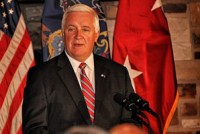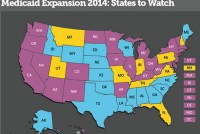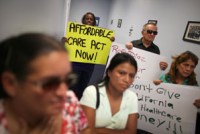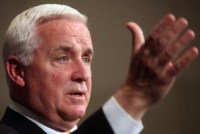Latest Morning Briefing Stories
Pennsylvania’s Medicaid Expansion To Require 723 New Workers
The number of state workers needed to expand the federal-state health care program for poorer Americans is far higher than most states have needed — typically in the dozens, not hundreds.
For Medicaid Patients, Access To Primary-Care May Not Be As Advertised
A survey conducted in Seattle found that half the time, primary-care providers listed as accepting new patients on Medicaid managed-care organization websites, in fact were not accepting new patients.
Missouri Medicaid Bill Wins Symbolic Committee Vote
Despite the procedural victory, even a GOP supporter of the bill does not expect passage of the Medicaid expansion plan during this legislative session.
Illinois Medicaid Moves To Managed Care
Hundreds of thousands of Medicaid recipients are being shifted into some kind of managed care this year as part of a sweeping overhaul.
Teresa Martinez: Waiting For Medi-Cal
Teresa Martinez, 62, from East Los Angeles makes $10,000 a year working as a hairdresser in a Koreatown salon. With her modest income she is likely to be eligible for health coverage under the Affordable Care Act’s Medi-Cal expansion.
Waiting For Medicaid To Kick In
About 800,000 people in California are presumed to be eligible for the newly expanded program but lack final approval. For a Los Angeles hairdresser and others like her, that means medical appointments are on hold.
Progress, Challenges As Medicaid Rolls Swell in Wash.
One of the most successful initiatives in the Affordable Care Act has been the effort to sign up patients to be covered by Medicaid under an expanded program. Now comes the hard part: facing up to challenges brought on by having so many more people in the program.
Adding Dental Care Contrasts With Mo. Legislature’s Opposition To Medicaid Expansion
Some of Missouri’s working poor have had no dental coverage since benefits were cut in 2005.
States Battle Asthma as Numbers Grow
With a climate especially bad for asthmatics, Missouri has been a pioneer in fighting the disease.
Kit Bond Works Missouri Capitol’s Halls On Medicaid Expansion
The former governor has been meeting with legislators, some of whom weren’t born when he first came to Jefferson City as state auditor in 1970.
What Happens Next On The Health Law?
As the first open enrollment period draws to a close, here are seven things to watch for clues about what the health law’s future might hold.
Nearly 1 Million More Sign Up For Obamacare Plans In February
But the number of enrollees, especially those between 18 and 34, continues to lag expectations.
IG Report Findings Could Strengthen Nursing Home Inspections
Nursing home oversight may be moving toward more effective ways to detect poor care.
Tough Road for States Seeking Customized Medicaid Expansion
Each of the states currently weighing expansion of Medicaid has a different idea of what it would look like.
There’s a Life-Saving Hepatitis C Drug. But You May Not Be Able To Afford It.
The price tag of the breakthrough treatment raises questions about the proper costs of pharmaceuticals.
Could Medicaid Expansion Debate Turn Into An Immigration Issue?
Proponents of expanding Medicaid in Florida argue that a ‘no’ vote means that legal immigrants will have access to insurance subsidies while some U.S. citizens go without coverage.
Medicare Data Show Wide Differences In ACOs’ Patient Care
The first public evaluation of how 141 networks of doctors and hospitals performed looks at five quality measures for patients with diabetes and heart disease.
Health Centers See Threat From ‘Private Option’ Medicaid
Shifting Medicaid enrollees into private plans could mean less money for clinics treating the poor.
Corbett’s Final Medicaid Expansion Plan: Gentler, But Still An Outlier
The plan by Pennsylvania Gov. Tom Corbett would use federal money to buy private insurance for newly eligible Medicaid enrollees and require work searches or job training.
Missouri House Republican Files Medicaid Expansion Bill
A Republican House member has filed a bill to expand Missouri’s Medicaid program.
















